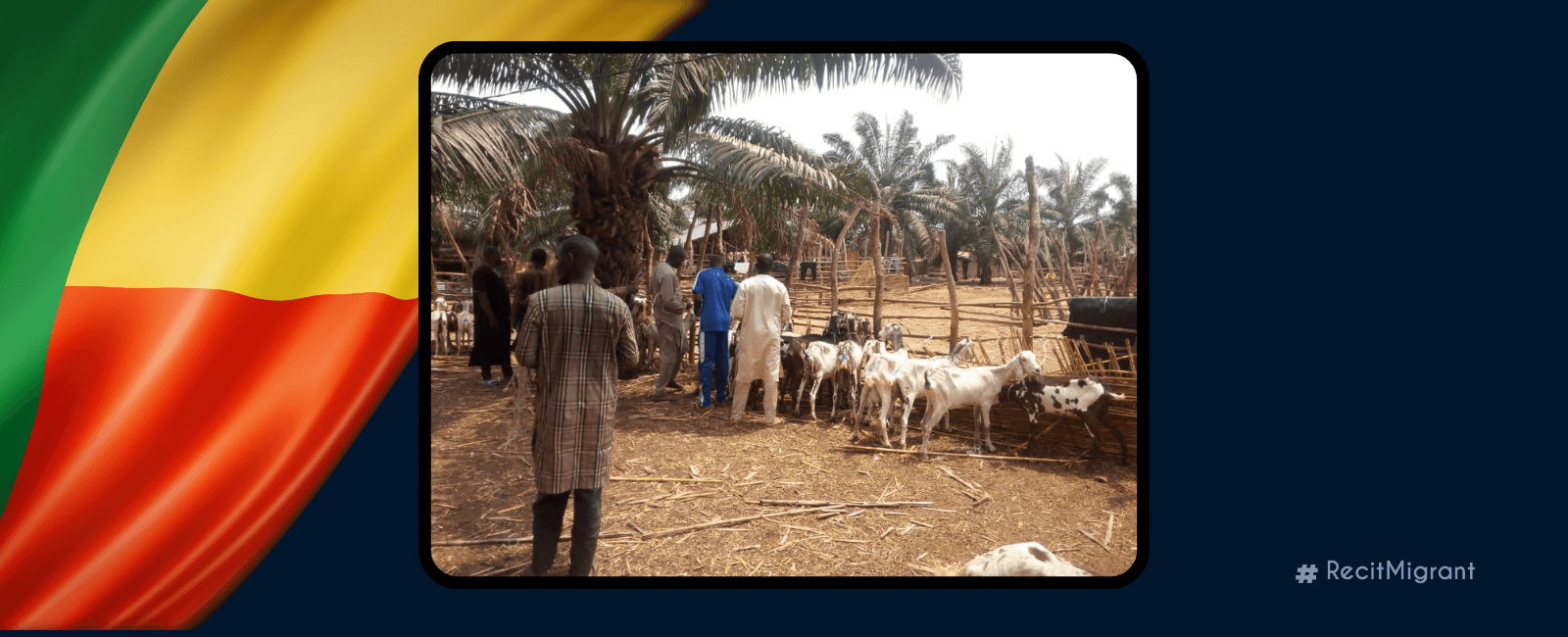

The central cattle station in southern Benin assembles cattle from Niger, Burkina Faso, Mali and northern Benin. It is located 45 km from Cotonou, at about an hour and a half drive. The station is 9 ha wide, 6ha of which are fenced in for the sale of cattle and the remaining 3 haserving as a lorry park. Situated in the Zè commune, this trading centre has attracted significant attention due to its unique and dynamic “melting pot” character.
People from Burkina Faso, Niger, Mali, Benin and other neighbouring countries are now living together in Zè, drawn by the cattle depot located in this Cotonou Suburb. To get there, at the crossroads of the Niamey-Cotonou interstate highway, the road turns off at the Zè road sign and continues for about 15 kilometres on the tarred road to central Zè.
Cattle are typically transported to the Zè station on Mondays and Fridays. On this particular Monday morning of February 2025, the cattle had already arrived prior to Dialogue Migration’s arrival. Upon entering the site, one could immediately spot a large number of sheds. In the centre of the site, is a mosque. Sheep dealers are conducting business with customers, while others are branding animals before transporting them to secondary sales points. The presence of numerous heads of Sahelian sheep and goats is also noteworthy.
While cattle drovers only stay temporarily, many nationals from the Sahel living in Benin for many years have engaged themselves in the livestock business.
“Many of us here are from Niger, Burkina Faso, Nigeria, Mali and Benin,” Abdourazack informed Dialogue Migration. Abdourazack is from Burkina Faso and has been working there for over 6 years. He brandished his Identity or CIP card, issued in Benin, clearly indicating his origins.
Mixing made easy: connecting communities through networks
One of the most significant aspects of this cohesion is their common religious allegiance.
“At the call of the muezzin, we all head to the mosque together. We pray together, eat together, do many things together; we even intermarry. We’re family and you wouldn’t have known had you not been informed that we originate from different countries,” Abdourazack explains.
He indicated that only their demeanor reveals they are not Beninese, that their trade is not a common Beninese activity. ‘’You may perhaps come across Beninese in this trade in Porto-Novo, Akpakpa or Calavi,‘’ he added. A visit to Zongo in Calavi actually revealed that only the Beninese are involved in the business there.
Abdourazack also justifies their integration by stating that they rent accommodation from the local population and that all their children are raised alongside the local people, making it impossible to differentiate between them.
Salam, a Benino-Nigerien whose parents are both from Niger, maintains that their ties are forged through their business relations, thanks to their interdependence. “Not everyone here practises the same religion. Some Beninese do not even practise the same religion as we do,” he points out.
The tarpaulin covered truck driver Julien, hardly finished loading his vehicle when he was offered to make new purchases. His interaction with the trader made their positions regarding the latter’s offer. “If I buy the goat, it’s for me to eat, not to sell. I just came here to transport animals that have already been bought,” he underlined.
Although the site is dedicated to the sale of livestock namely goats (kids, billy and nanny goats), sheep and cows, other activities are also being carried out on the premises, in particular the sale of ‘tchatchanga’ – small pieces of grilled mutton or beef. This business is often run by people from Niger. There are also a number of boubous sewing workshops, popular African traditional attire in communities in the Sahel region. Small restaurants and kiosks run by women from Niger and Benin are also visible.
Diversity of languages, and yet still…
According to the people we spoke to, the communities living in this cattle shed coexist harmoniously. There are Fulani, Hausa and Zarma speakers. Residents also speak French, along with local Beninese languages, especially when interacting with customers.
The harmonious life shared by nationals from different countries continues to be highly valued. “You never know when and where you might bump into each other someday. I was born here to parents from Niger. I feel at home in both Benin and Niger,” says Salam. The young man, in his twenties, was using nets from a boat salvaged from the docks to weave the threads used for tethering the animals. “The animals don’t come with ropes; we make them ourselves and sell them,” he explains.
Furthermore, some communities possess a specific area within the site.“We are all together, but the Burkinabe have their own area. However, because we are united, you can safely say that we are members of the same family,” Salam remarked.
States’ responsibility
“They are here because the State allocated this place to them. The government cannot make mistakes,” says Jean Vigan, a Beninese who came to buy a sheep and was guiding it towards the exit.
“If they weren’t here, I never would have found any livestock to buy. I consider this a commendable initiative and it would be highly advantageous if we had similar initiatives such as this one”, he said in Fon, the most widely spoken local language in southern Benin. This native, who travelled from neighbouring Toffo to buy sheep for breeding purposes, believes that ‘foreigners’ are important for boosting the economy and development.
“Nothing is different here because we’re all the same. You cannot differentiate between foreigners and citizens. When you speak of a citizen, you’re essentially referring to a foreigner. This is because, in reality, we are all the same. We all live in the same country, and as such, no one can tell us apart,” says Mouhamed Salaou, a Beninese retailer from Kandi, in the north of the country.
In his view, it’s good that ‘foreigners’ are coming to the country. However, he also highlighted the challenges and the high cost of livestock at the wake of the Benin/Niger border closure.
“It is good to be together. There are people from different countries here. They’re not just from Niger and Benin. This kind of coexistence helps people understand each other better”, Kamillou, from Parakou, northern Benin, asserts. In spite of this, there have been isolated incidents of disagreement and intimidation. “Others view the label ‘baba’ (father in Hausa—editor’s note) for these communities as overly simplistic, or demeaning.”
Recently Published
Subscribe to our newsletter!
Quick Links


